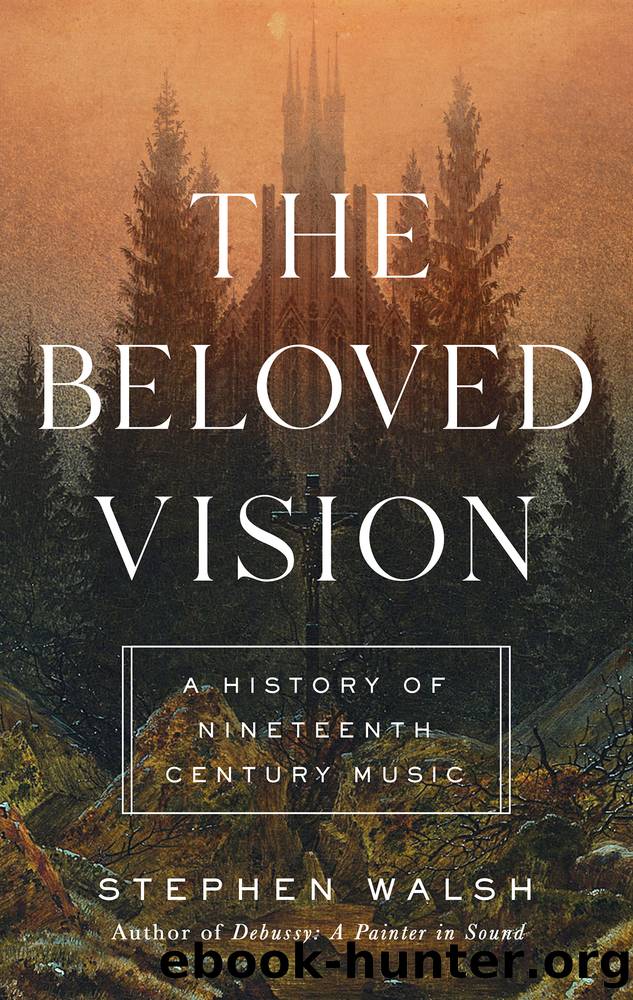The Beloved Vision by Stephen Walsh

Author:Stephen Walsh
Language: eng
Format: epub
Publisher: Pegasus Books
Published: 2022-10-04T00:00:00+00:00
11 The Nation Speaks
While Wagner languished in Zurich, writing, composing, conducting, philandering, but with his work largely unperformed, operatic life carried on elsewhere in blissful ignorance of the artistic minefield he was laying. When Liszt conducted Lohengrin in Weimar in August 1850, with its exiled composer tracking its course on a clock in a Zurich inn, it was the last Wagner premiere until he himself conducted the prelude to Tristan in a Paris concert in January 1860. One could read his books, if one had the stomach and the necessary German. But with none of the relevant music available, or even in existence, they would probably confuse more than they would elucidate. Imagine having struggled through Opera and Drama, then being confronted with the Tristan prelude and desperately trying to relate this strange, intense, wordless complexity to what youâve been reading. Better to have read nothing. After attending Wagnerâs Paris concerts, the poet Charles Baudelaire wrote him a letter of rapturous appreciation that responded entirely to the atmosphere of the music and ignored any theoretical underpinning. The audience reaction to Tannhäuser at the Opéra the following year was admittedly somewhat less than rapturous, and certainly not because those responsible for the racket that accompanied all three performances had been reading about Wagnerâs theories. The background was almost certainly political: anti-Austrian in the person of the ambassadorâs unpopular wife, Princess Pauline Metternich, who had sponsored the production, and perhaps anti-German as well. The reason often given â that Wagner had failed to include a ballet in the traditional spot in Act 2 but had instead hugely expanded the Venusberg music that follows the overture â makes little sense. Successful recent operas had got by without significant ballets, or (like Rossiniâs William Tell or Meyerbeerâs Le Prophète) with ballets in other acts.
The contrast between Wagner and Verdi in the 1850s could hardly be starker. By 1850 Verdi had established himself beyond question as the leading composer in Italy; but it was a status that demanded a continuous presence in the public eye. In Italy, at least, the idea of an operatic repertoire was still in its infancy, and it was almost impossible for a composer to retain his position without a flow of new work. Verdi no longer needed to churn out an opera or two every year, as he had been doing since 1839. Nevertheless between 1851 and 1853 he composed three works that have since become models of Italian opera: everyoneâs idea of what Italian opera is, even though, as it happens, they are already moving away from the standard model. Then over the following eight years he added another four operas, sharply differentiated from one another, driven, however, not by theory, but by the response of a vigorous, restless-minded genius to the varying circumstances that arose from his fame.
Between them the three great works of the early fifties â Rigoletto, Il trovatore (The Troubadour) and La traviata â are an object lesson in how to take a conventional genre by the scruff of the neck and force it to yield hitherto unsuspected secrets.
Download
This site does not store any files on its server. We only index and link to content provided by other sites. Please contact the content providers to delete copyright contents if any and email us, we'll remove relevant links or contents immediately.
| Classical | Country & Folk |
| Heavy Metal | Jazz |
| Pop | Punk |
| Rap & Hip-Hop | Rhythm & Blues |
| Rock |
Cecilia; Or, Memoirs of an Heiress — Volume 2 by Fanny Burney(31956)
Cecilia; Or, Memoirs of an Heiress — Volume 3 by Fanny Burney(31942)
Fanny Burney by Claire Harman(26603)
We're Going to Need More Wine by Gabrielle Union(19046)
Plagued by Fire by Paul Hendrickson(17412)
All the Missing Girls by Megan Miranda(16029)
Cat's cradle by Kurt Vonnegut(15355)
For the Love of Europe by Rick Steves(14121)
Bombshells: Glamour Girls of a Lifetime by Sullivan Steve(14076)
Leonardo da Vinci by Walter Isaacson(13336)
4 3 2 1: A Novel by Paul Auster(12393)
The remains of the day by Kazuo Ishiguro(8999)
Adultolescence by Gabbie Hanna(8927)
Note to Self by Connor Franta(7671)
Diary of a Player by Brad Paisley(7581)
Giovanni's Room by James Baldwin(7346)
What Does This Button Do? by Bruce Dickinson(6207)
Ego Is the Enemy by Ryan Holiday(5450)
Born a Crime by Trevor Noah(5382)
